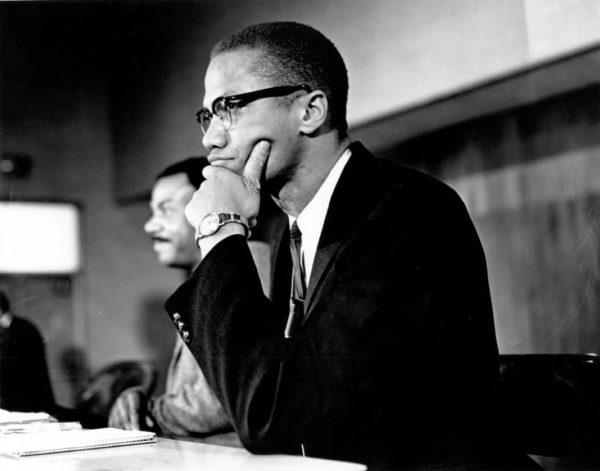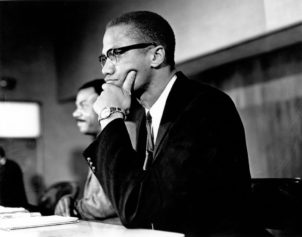Over 30 years after Black students took over one of the oldest buildings on campus to ask the administration to take down a quote that they say misrepresented a prominent Black Muslim leader’s words, the University of Rhode Island has finally removed a partial quote by Malcolm X from the facade of its library.
The controversial Malcolm X inscription was nearly 20 feet by 7 feet, carved on “black granite facade panels from the end of a sixty-five-foot hydraulic boom lift,” and was unveiled to the community in October 1992.
Back then, Black students took exception to the inscription and protested by taking over URI’s Taft Hall, despite the school’s insistence that the quote was meant to be a tribute to the Black nationalist leader.

However, on March 10, the institution’s president, Marc Parlange, took action and fixed the three-decade-old concern — making good on a promise he made to the Black alumni after meeting with them in 2022 during their 30th anniversary of Nov. 10, 1992, protest, The Associated Press reported.
During the commemoration, the newly installed president said, “Tonight, it is very important we acknowledge that 30 years ago, there was a group of students who stood up and had the courage to address injustices that were happening at the time.”
Parlange stated he was “happy to share” with the group that protested the inscription and would “work on removing the etching on the library … by the end of the year.”
Working beside him is URI alumna, interim vice president for community, equity, and diversity, and original member of the BSLG Michelle Fontes, to find “an alternative installation for the library.”
In 1992, a total of 200 students, including the campus’ Black Student Leadership Group, raised concern about how the school used Malcolm X’s quote out of context in an inscription on the Robert L. Carothers Library and Learning Commons.
The inscription used on the library paraphrased a quote from “The Autobiography of Malcolm X” and read, “My alma mater was books, a good library … I could spend the rest of my life reading, just satisfying my curiosity.”
However, the statement, if read in its original context, students argued, is more profound.
The full quote from the 1965 book (the 59th paragraph of the 11th chapter) concentrated on what things Malcolm X would have done if he was not so busy fighting for the rights of his people.
The quote reads, “I told the Englishman that my alma mater was books, a good library. Every time I catch a plane, I have with me a book that I want to read — and that’s a lot of books these days. If I weren’t out here every day battling the white man, I could spend the rest of my life reading, just satisfying my curiosity — because you can hardly mention anything I’m not curious about.”
The abridged version of the quote was meant to celebrate his love for books, but the students did not believe the school considered the context of the fuller statement.
A documentary was made and debuted on the anniversary to honor the change the takeover sparked.
Sophomore Cristóbal Bustos was tapped by members of the BSLG to direct and produce a documentary on the “Taft Takeover.”
Earl Smith, the late assistant dean of the College of Arts and Sciences, Malcolm Anderson, the spokesperson for the 1992 protest, and I. Lanre Ajakaiye approached the student to help pull it together. They premiered the film at the ceremony to commemorate the 30th anniversary of the takeover. In addition to the actual Taft Hall takeover, it explained how the action impacted more than just the library quotes.
The film depicted how the BSLG also pushed for the school to have an Africana Studies major and a new Multicultural Student Services Center, both of which now exist. It also examined “other conditions on campus that led to heightened racial tensions” in the documentary.
When talking about the total work, Ajakaiye said, “It forever captures one of URI’s most powerful moments of strategic, student civic engagement with many of the participants now being leaders throughout the state at very high levels.”
In a statement, Parlange said his administration only finished the work started by the students.
“The removal of this inscription started 30 years ago when a group of URI students had the courage to stand up and speak out against injustices happening at that time,” the president shared.
“Our university is grateful to those students for their courage, and I am grateful to today’s generation of student leaders who, advocating in that same spirit, continue to inspire our ongoing work to foster a truly inclusive and equitable community,” he continued.


